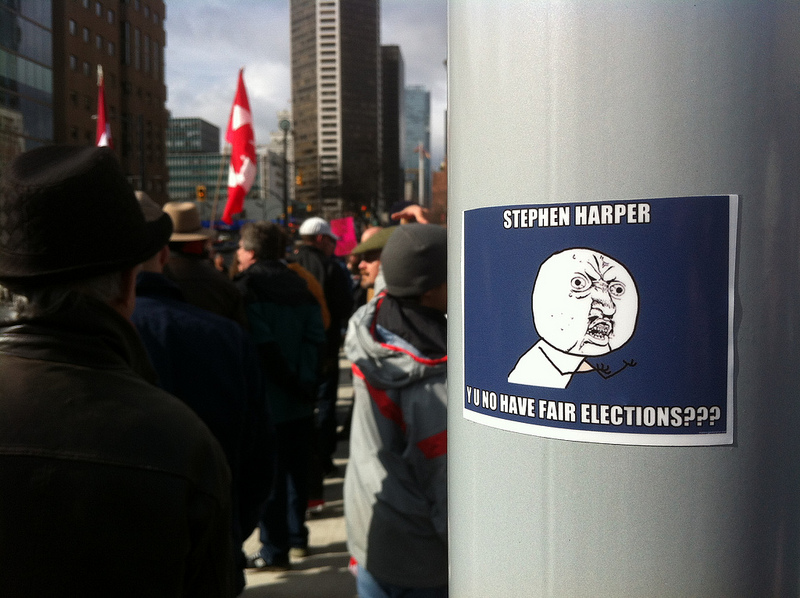If you’re a low-level political operative, the conviction of Conservative party staffer Michael Sona for his role in the robocall scandal may well have deterred you from committing voter fraud in the future.
But if you’re a high-level political operative, the outcome of Sona’s trial probably left you emboldened.
With a federal election looming, the stage is set for more voter fraud. But this time there’s very little chance we’ll ever find out about it, due to changes the Conservatives have made in Canada’s election laws.
Indeed, the robocall scandal is a stunning case of Stephen Harper’s Conservatives managing to slither out of what could have been very deep trouble — while imposing a new set of rules to protect those engaging in future voter suppression.
Certainly, the Conservatives seem to have dodged a bullet. After months of investigation and court proceedings into allegations of an organized attempt to send non-Conservatives to the wrong polling stations on election day in May 2011, the party itself has emerged with (technically) clean hands.
Blame for the scandal was meted out solely to Sona, the former party operative in Guelph who was sentenced to nine months imprisonment and released on bail this week.
Avoiding any responsibility was no small feat for the Conservative party, given how strongly the evidence pointed to some sort of organized scheme, presumably involving the authorization — or at least the tacit co-operation — of high-level officials within the party.
Indeed, in a 100-page ruling, Federal Court Judge Richard Mosley found that there was an organized campaign of voter suppression, and that the information used to make misleading phone calls to non-Conservative voters likely came from the Conservative party’s internal database, known as CIMS.
CIMS contains precious voter information painstakingly gathered by the party. Access to it is tightly controlled by top party officials. Yet in the days just before the 2011 election, someone downloaded a list of non-Conservative supporters from CIMS, according to documents filed with the court by Canada’s Commissioner of Elections.
“I can’t think of a legitimate reason to download a list of non-party supporters on the eve of an election,” noted Steven Shrybman, lawyer for the Council of Canadians, which brought the lawsuit in connection with the voter suppression allegations.
That mysterious download of top-secret Conservative data was never explained by party officials, who were not required to testify — an aspect of our election laws which has long been criticized.
In the separate case against Michael Sona, Judge Gary Hearn also found that “the evidence indicates he did not likely act alone.”
Yet despite the fact that two judges have suggested the robocall scandal likely was part of a wider scheme involving more than one person, the Harper government has taken no steps whatsoever to prevent this sort of political conspiracy from happening again.
On the contrary, in the name of clamping down on “voter fraud,” the Conservatives have brought in election reforms that will actually make it easier for voter suppression to go undetected in the future.
That’s because the government’s controversial election reform package includes a section that prevents the Commissioner of Elections from revealing any details about investigations being conducted by Elections Canada.
Shrybman insists that if this “muzzling” of the Commissioner had been in place in 2011, we almost certainly would never have found out about the robocall scandal.
The robocalls came to light only because, after receiving complaints of electoral irregularities (primarily involving Guelph), the Commissioner of Elections began to investigate and filed a court application related to that investigation. After the details of the application were picked up by the media, there was a flood of complaints from citizens across the country reporting they received similar misleading phone calls on election day.
Had the new “muzzling” rule been in place, the application filed by the Commissioner would have been sealed, preventing the public from knowing about the initial investigation — the trigger that prompted the nationwide response, allowing the public to see a larger pattern of possible voter suppression.
Had the Conservatives actually wanted to prevent a repeat of the robocall scandal, Shrybman says, there’s a simple solution: They could require political parties to maintain records of any downloads of internal party data about non-party supporters.
But the government’s massive overhaul of our electoral laws last spring took no steps in that direction. Instead, it used the catchphrase “voter fraud” to justify sweeping changes that will make it more difficult for poor, marginalized and other non-Conservative-type voters to actually vote.
It’s striking that the Conservatives don’t seem the slightest bit concerned that the party’s top-secret internal database was apparently used as part of an organized campaign of voter suppression.
Rather, as they gear up for the next election, the Harper crowd is focused on ensuring that not a single vote by an undocumented homeless person, student or senior will be allowed to contaminate our democracy.
Winner of a National Newspaper Award, Linda McQuaig has been a reporter for the Globe and Mail, a columnist for the National Post and the Toronto Star and author of seven bestsellers, including Shooting the Hippo: Death by Deficit and other Canadian Myths and It’s the Crude, Dude: War, Big Oil and the Fight for the Planet. Her most recent book (co-written with Neil Brooks) is The Trouble with Billionaires: How the Super-Rich Hijacked the World, and How We Can Take It Back.
This article is reprinted with permission from iPolitics ![]()
Photo: Neal Jennings/flickr



